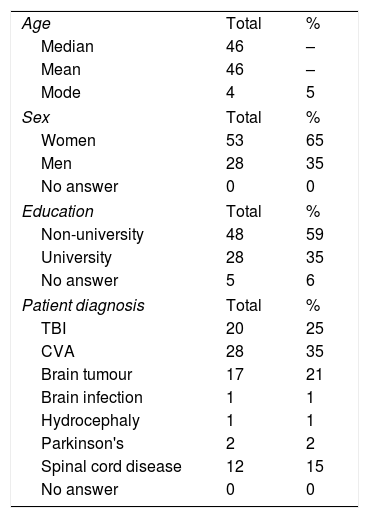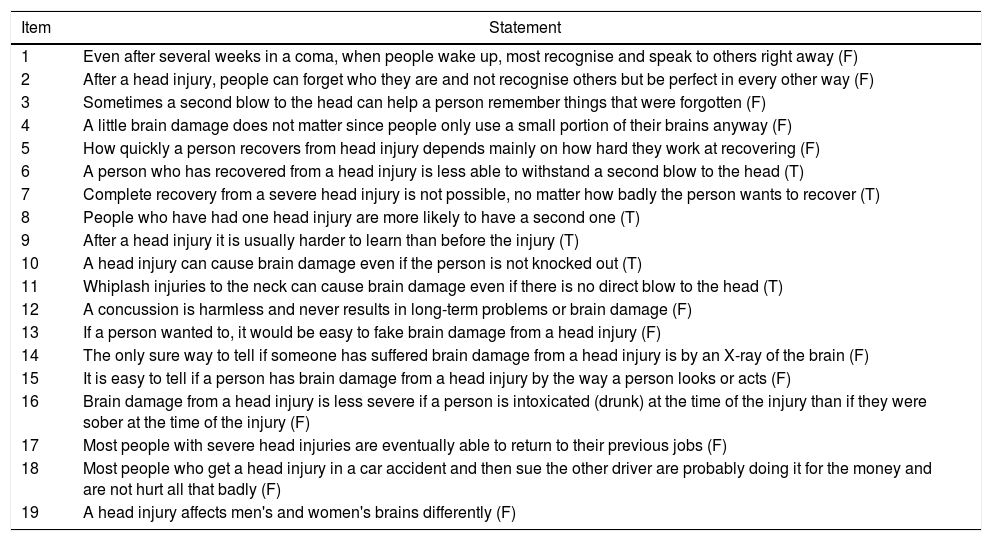Several studies have shown misconceptions about brain injury in different populations. The aim of this study was to assess the knowledge and perceptions about brain injury of family members of neurosurgical patients in our hospital.
Material and methodsThe participants (n=81) were relatives of patients admitted to the neurosurgery department between February and August 2016. They voluntarily completed a 19-item true-false format survey about brain injury based on a translation of other questionnaires used in previous studies from other countries (USA, Canada, UK, Ireland and New Zealand). Also, some sociodemographic data were collected (age, sex, education level and the patient's pathology). Data analysis was developed through graphical modelling with a regularisation parameter plotted on a network representing the association of the items of the questionnaire from the response pattern of participants.
ResultsData analysis showed two conceptual areas with a high rate of wrong answers: behaviour and management of patients, and expectations about acquired brain injury recovery.
ConclusionsThe results obtained in this study would enable us to objectify misconceptions about acquired brain injury in patients’ relatives attended in the neurosurgery department. This lack of knowledge could be a great obstacle in patients’ recovery process. Therefore, we suggest placing the emphasis on the provision of information on brain injury to patients’ families, especially with regard to its symptoms and course of development.
Diversos estudios han puesto de manifiesto las creencias erróneas sobre el daño cerebral en diferentes poblaciones. Nuestro objetivo consiste en valorar el conocimiento que poseen los familiares de los pacientes neuroquirúrgicos sobre el daño cerebral adquirido.
Material y métodosParticiparon 81 familiares de pacientes ingresados durante el periodo comprendido entre febrero y agosto de 2016. Se utilizó la traducción de un cuestionario aplicado en estudios anteriores en múltiples países (EE. UU., Canadá, Reino Unido, Irlanda y Nueva Zelanda). Se registraron algunos datos sociodemográficos (edad, sexo, nivel educativo y patología del paciente) así como las respuestas a los 19 ítems verdadero/falso que constituyen el cuestionario sobre daño cerebral adquirido. El análisis de datos se ha desarrollado mediante una modelización gráfica con parámetro de regularización configurando así una red que muestra el nivel de asociación de los ítems del cuestionario a partir del patrón de respuestas de los participantes.
ResultadosEl análisis de los datos muestra dos áreas conceptuales con una elevada tasa de error en los ítems asociados: el comportamiento y el manejo de los pacientes, y las expectativas sobre la recuperación en daño cerebral adquirido.
ConclusionesCon este estudio podemos objetivar las áreas de falsas creencias sobre el daño cerebral que poseen los familiares de los pacientes atendidos en el servicio de neurocirugía. Este desconocimiento puede suponer un obstáculo en el proceso de recuperación de los pacientes. Por lo tanto, proponemos hacer hincapié en la información sobre el daño cerebral a los familiares de estos pacientes, sobre todo sus síntomas y su evolución.
Article

If it is the first time you have accessed you can obtain your credentials by contacting Elsevier Spain in suscripciones@elsevier.com or by calling our Customer Service at902 88 87 40 if you are calling from Spain or at +34 932 418 800 (from 9 to 18h., GMT + 1) if you are calling outside of Spain.
If you already have your login data, please click here .
If you have forgotten your password you can you can recover it by clicking here and selecting the option ¿I have forgotten my password¿.













